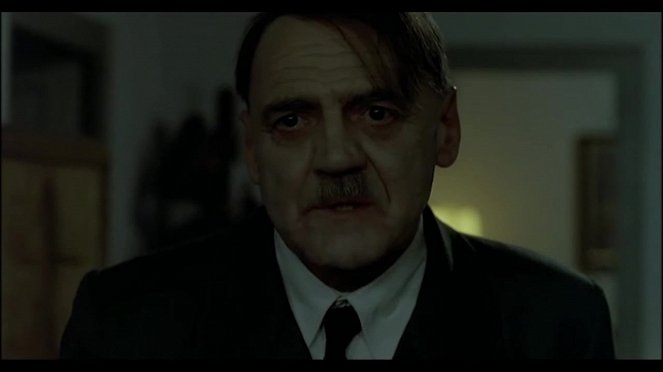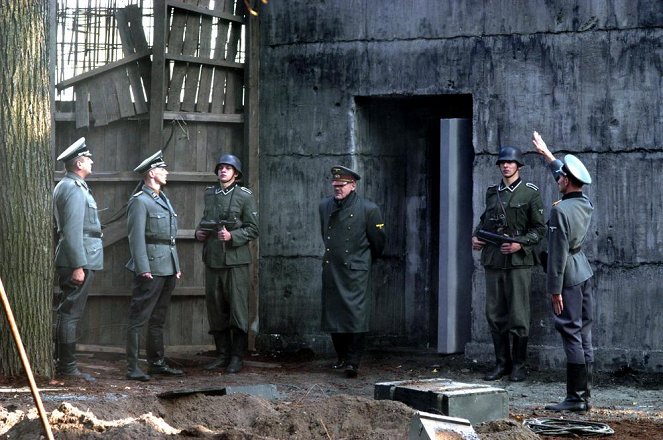Director:
Oliver HirschbiegelGuión:
Bernd EichingerCámara:
Rainer KlausmannMúsica:
Stephan ZachariasReparto:
Bruno Ganz, Alexandra Maria Lara, Corinna Harfouch, Ulrich Matthes, Juliane Köhler, Heino Ferch, Christian Berkel, Matthias Habich, Thomas Kretschmann (más)Sinopsis(1)
Berlín de 1945. Con la nación está a punto de caer fruto de una encarnizada batalla que se libra en las calles de la capital. Hitler y su círculo de confianza se han atrincherado en el búnker del Führer. Entre ellos se encuentra Traudl Junge, secretaria personal de Hitler. En el exterior, la situación se recrudece. A pesar de que Berlín ya no puede resistir más, el Führer se niega a abandonar la ciudad. Mientras el sangriento peso de la guerra cae sobre sus últimos defensores, Hitler prepara su despedida final. (DeAPlaneta)
(más)Videos (3)
Reseñas (10)
Nunca había visto un público tan silencioso en un multicine durante los créditos finales. El hundimiento es una modesta obra maestra, fuerte sobre todo por el contenido que reconstruye. Por el peso de los acontecimientos en cuestión. Ya que en cuanto a la imagen, se trata de un asunto interior teatralmente austero, basado en la concepción más realista de la escena y la interpretación de los actores, que es realmente única. No sólo Bruno Ganz, sino también los demás actores trabajan con el máximo compromiso. Muy buena elección de los intérpretes de los Goebbels, cuya sangre fría y devoción enfermiza por el Líder casi abruman la terrible expresión de la personalidad demoníaca de Hitler. La mirada fría de Goebbels me perseguirá durante algunos viernes. Entre otras cosas, la película estimula la idea de cómo habría sido el mundo si Hitler hubiera llevado su plan hasta el final. La escena en la que pasea con un discurso visionario junto a una maqueta del centro de la capital del Tercer Reich es una de las mejores de la película.
()
A movie that seems more like a documentary that isn’t so much about Hitler’s last days, as about the people around him and his last atrocity committed on his own nation. Certainly worth watching, but if it hadn’t been made by Germans, it would never have caused such a stir (is it really making Hitler seem more human if he thanks his cook for his food?). Even so, it’s good that it was the Germans who filmed it; they need to chase the skeletons out of their closet.
()
The roaring protagonist Ganz may look like Hitler, but that's not enough for a good movie. After the first half hour, all the dramatic unrest or sadness of the supporting characters starts to play out lightly, and the final catharsis doesn't have time to fix anything. In the end, the war film crystallizes into a dramatic journey through the history of Germany, accompanied by confused editing and a sense of a (non)eventful film that was only talked about from a thematic standpoint.
()
For a person who is not interested in history and confuses Husák with Hitler, it is certainly a meritorious and interesting piece of work, but for someone with an interest in history, it is a modest account that does not bring any fundamental new information and not even the controversial view of one human being that is so much proclaimed in the press. In any case, the performances were excellent, including Bruno Ganz, whose role was tempting to overact, which fortunately did not happen. Overall, I would see it as a three and a half stars, rounded down this time due to the high expectations.
()
The only negative of the film Downfall is its formal aspects. This is not a key and fatal negative, as some "I always have to write something different than the others" reviewers try to prove in their analyses. The director and screenwriters chose as the main narrative perspective "documentary distance" from the story and, adversely, a very expressive approach to the atmosphere. As a result, the dialogues have a austere and non-stylish feel, while the suffocating atmosphere of the bunker is abundantly and impressively complemented by sound effects (silence vs. rumbling), a camera (which sticks to the characters and promotes a claustrophobic and hopeless feeling) and editing (combining the illusion of interiors with naturalism in exteriors). While the expressive component of the film works perfectly, the documentary aspects tend to slip into excessive semi-pathos, multi-wording, and boringly branched dialogues, which, with a certain repetitiveness, take away momentum from the film. Not fatally, of course. The introduction of a "secondary" narrator in the form of Traudl Jung also proved very useful, who mediates a civilian view of the icons of the Third Reich - a civilian view which, in its naivety and blindness, is perhaps the most tragic feature of the film. And Jung's documentary suffix only points him out in all his nudity "...I should have been more interested..." A chilling finish of one of the storylines. But "Downfall" has more storylines, and it must be admitted that director Oliver Hirschbiegel was able to portray them all with certainty and persuasiveness. The result is a film with a raw atmosphere, teasing with questions (which the viewer has to answer for himself), and it is oppressive in that it does not hide anything with the poor decoys of heroic pathos. German cinema successfully passed the state exam in post-war adulthood...
()



Anuncio